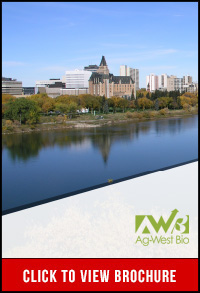Heart of the industry
 Open the dictionary to the definition of “Agriculture and Biotechnology,” and you should find a map of Saskatchewan.
Open the dictionary to the definition of “Agriculture and Biotechnology,” and you should find a map of Saskatchewan.
Next to that should be a list of a vast range of industries and products that extend well beyond crops and livestock. Biomedicine, bioproducts, digital technologies, environmental stewardship, biofortification, animal welfare and food security are just some of the exciting categories in the realm of agriculture and biotechnology.
Saskatchewan is the Place to Be
It’s nearly impossible to overemphasize Saskatchewan’s role in advancing the global agriculture industry. Whether a start-up, well-established company, or global player, agriculture businesses have one thing in common: Saskatchewan is the place to be.
Why is Saskatchewan a leading centre for agricultural bioscience? With over 100 years of history in agricultural science, Saskatchewan enjoys a reputation as a global leader. Saskatchewan has more than 40 percent of Canada’s total cultivated farmland—over 60 million acres of agricultural land.
Like the forests and oceans, the prairies are a natural resource integral to Canada’s commodities market. The 2016-2017 Saskatchewan budget states that the province’s agriculture sector was responsible for $15.1 billion in agri-food exports in 2015. The province exceeded its ambitious target, laid out in the Saskatchewan Plan for Growth (launched in 2012), to export $15 billion of agricultural and agri-food products by 2020.
World-Class Infrastructure
The industry is supported by world-class infrastructure and resources, and a highly integrated research community, with much of the bioscience research community clustered around Innovation Place Technology Park and the University of Saskatchewan in Saskatoon. The cluster is anchored by prominent research institutions such as the Canadian Light Source synchrotron, Agriculture and
Agri-Food Canada, the National Research Council, the Vaccine and Infectious Diseases Organization – International Vaccine Centre, and many more.
Saskatoon has a major concentration of agricultural research organizations. Many of them are public, including the University of Saskatchewan and government research laboratories. This critical mass has more than 1,000 researchers that are involved in aspects of the agricultural and food research areas working ostensibly side-by-side.
Both the provincial and federal government recognize the importance of supporting the province’s primary industry. Strategic investments of $388 million for agricultural research since 2013 has cemented the region’s reputation as a research centre.
Like a Silicon Valley for agriculture and biotechnology, close proximity to such a vibrant research and development community is a major incentive for business. The Province assists incoming companies to explore opportunities and locate in the best geographic site, and works with them in respect to major issues like infrastructure costs. Saskatchewan is also a competitive place in terms of business taxes.
“I believe our jurisdiction is as competitive as any in attracting business, but our central location in a large arable land mass, and direct access to thousands of people with expertise is second-to-none,” says Wilf Keller, President and CEO of Ag-West Bio, Saskatchewan’s bioscience industry association. “It allows for contact and sharing of ideas. This often results in new partnerships and initiatives, and ultimately, new products.”
“We see different types of business arrangements and agreements depending on company size,” says Keller.
To generalize, very new entrepreneurial start-up companies find incentives; medium-sized companies benefit from infrastructure; and global players get direct access to a wide range of expertise.
The National Research Council, another key contributor to the industry, has been integral in research initiatives: from the advent and development of the $12.2 billion dollar canola provincial industry, to more recent successes in crop genomics. The Canadian Wheat Improvement program is NRC’s contribution to the Canadian Wheat Alliance, which also includes Agriculture and Agri-Food Canada and the University of Saskatchewan.
All this activity leads to high-quality jobs in the Canadian economy. According to a Canola Council of Canada study called the Economic Impact of Canola on the Canadian Economy, the canola industry alone accounts for 92,000 jobs and $3.9 billion in wages in Saskatchewan, and generates $26.7 billion in economic benefits a year. This is one of many examples of the importance of agriculture to the national economy.
Feeding the World
A striking fact: By 2050, the world’s population will reach 9.6 billion. Feeding this many people is a task scientists and farmers are working on now. Meeting the world’s growing demand for food will require a 70 per cent increase in agricultural productivity. Located at the University of Saskatoon, the Global Institute for Food Security (GIFS) is working towards improving production efficiency through technologies that will have commercial viability around the globe, while creating huge economic opportunities locally.
“Emerging technology makes agriculture better in many ways,” says Keller. “Smart machinery that uses less energy and is easier to operate, and better management of end-crop products—these are all important in building an economic base. With research into food processing, higher-quality and greater production in crops; increasing basic knowledge, such as in photosynthesis—all of these things coming together are going to help tackle global food needs.”
Global food security needs to be tackled, but there are issues on two levels, according to Keller. Famine and hunger in the developing world needs to be addressed through technology; but there is also an emerging middle class in countries such as China, Korea, and India, where over a billion people—more than North America and Europe combined—will want higher quality food, and more meat. “There is going to be a terrific opportunity for Canada to meet those market demands,” says Keller. “No question about it.”






